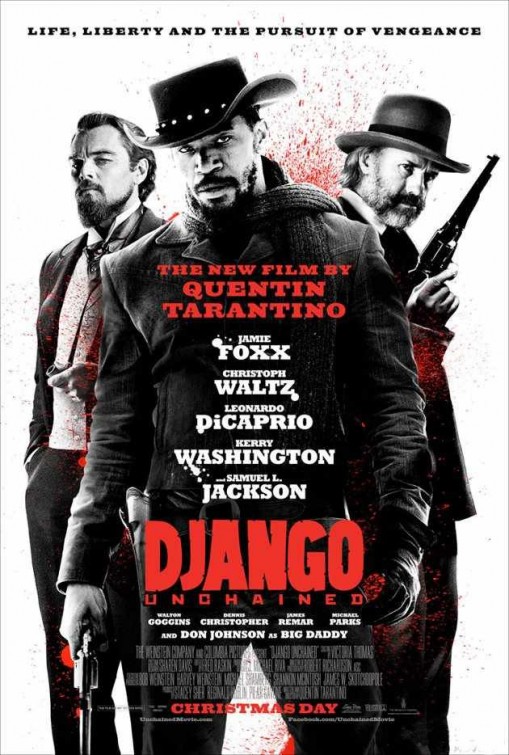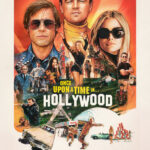Life, Liberty And The Pursuit Of Vengeance
Director
Quentin Tarantino
Starring
Jamie Foxx
Christoph Waltz
Leonardo DiCaprio
Kerry Washington
Set two years before the US civil war, Django Unchained opens with the introduction of our eponymous hero [Foxx], a slave who is freed and recruited by the eloquent and loquacious German bounty hunter, Dr. King Schultz [Waltz]. Schultz enlists Django’s help in tracking down three plantation workers known as the Brittle brothers. After his task is completed, Schultz recognises Django is incredibly gifted with a gun and the two partner up for the winter. It is during this time that Schultz learns of Django’s wife, Broomhilda [Washington], who was sold off separately. Moved by Django’s plight, Schultz agrees to help him locate his wife. On their adventures, they learn that Broomhilda is the current property of a deceptively charming but wholly sinister plantation master and Francophile, Calvin Candie [DiCaprio]. Fully aware that Candie will not simply sell Broomhilda, they concoct an elaborate ruse to buy her freedom.
Tarantino’s always been a fan of sixties and seventies pulp cinema; that merging of cheap directorial flare, exploitative themes, anachronistic scores and a melting pot blend of west, east and everything in between. These influences were present in his first three films (Reservoir Dogs, Pulp Fiction and Jackie Brown) but when the 2000’s rolled around, Tarantino stepped away from simple influence to flat out reproduction, with high budget grindhouse features such as Kill Bill, Death Proof and Inglourious Basterds. Django Unchained is very much a continuation of this direction albeit playing down some of the more jarring aspects, such as random voiceovers, colourful fonts and expository narrative jumps. The elements that remain almost serve to accentuate the excessiveness of the story; the ridiculous zooms, eccentric characters and the over-the-top violence and swearing. But the thing that separates Tarantino’s films from the slew of sub-par grindhouse productions is his impeccable dialogue, storytelling and the calibre of actor he employs. Almost as if he has taken the most exquisite cake ever baked and decorated it with crudely drawn naked stick people: it should be repulsive but it’s surprisingly spectacular.
With Inglourious Basterds, Tarantino seemed to set out with one solitary goal, to portray the face of Jewish vengeance (a quote which I highlighted in my review). Django Unchained bears a remarkable similarity to the extent that he has once again taken a previously popular genre and warped it to illustrate the face of African-American vengeance. Curiously enough, his choice to do this, being white, will no doubt cause immense controversy. Despite the fact that his depictions of a life in slavery are tame by comparison to the reality people were actually forced to endure, the excessive violence and use of the word ‘nigger’ is going to irritate a lot of people. Furthermore, I’m not exactly sure this film is one about black vengeance and more about white guilt but I could ramble about that for hours. Being an exploitative film doesn’t exactly help Django Unchained’s argument either but like every single Tarantino film, if people don’t like it, they don’t have to watch it.
Aside from the more ridiculous elements, this film is a technical delight. The cinematography is crisp and beautiful, the costumes and production design are breath-taking and the editing and pacing are so spot-on that two and a half hours sail by without notice. Whereas the score should be completely distracting, taking the audience out of the film, it almost immerses them further. I’m of the firm belief that music makes a film (whether used powerfully, softly or absently) and Tarantino has always held out that if someone else scores your film, you (as the writer/director) lose a lot of the creative control over the mood of the scene, hence his use of contemporary music and scores from other films – most often and most notably Ennio Morricone. Then there’s the acting. True Tarantino traits aren’t necessarily the use of violence and grisly deaths, it’s the memorable characters and their brilliant dialogue. Each and every actor is wonderfully cast, bringing an ingenious level of humour, wit, menace and charm – an observation that isn’t limited only to the leads but to the supports and extras as well.
The biggest flaw I can find with this film and the reason I’ve marked it down to an eight out of ten, is Tarantino’s grindhouse influences. As much as it serves him, it also cripples him, ensuring that the pulp elements overtake the credible weight. So what should be a clear-cut message piece becomes a trivial ‘fun’ (if you’ll permit me to use the word fun) piece and robs the plot of its severity at times. Furthermore, it’s not original. All you have to do is rent a handful of b-movies from the seventies, mash them up and you’ll see everything Tarantino has been striving for these last twenty years; the unfortunate truth that drawing on the work of your idols has the knack of producing something derivative. That and Tarantino’s indulgent cameo which, while amusing, was wholly unnecessary and really jarring.
On the whole this is a surprisingly entertaining film but for some reason, lacks the gravitas of a release such as Inglorious Basterds. Whether that’s due to the streamlining in character quantity or the subject matter itself, I couldn’t say but it remains a remarkably visceral, impressive flick.
Release Date:
18th January 2013
The Scene To Look Out For:
Two scenes that stand out, for wholly different reasons, are the lynch mob scene and DiCaprio’s explosive skull scene. The first is an example of Tarantino’s undercutting of a serious issue with humour and ridicule. Having successfully claimed a bounty from an atypical plantation owner, both Django and Schultz are set upon by a hooded lynch mob. The second they ride over the hill, flaming torches and rifles in hand, we are treated to a brief flashback, explaining that the masks were poorly designed and that none of the riders can actually see out of them. The second takes place shortly after Candie suspects the bounty hunter’s intentions. He removes from an ornate box, a polished human skull. As he taps and points with professorial precision, you can feel the tension building before Candie finally snaps and bellows at his guests. A prime example of how terrifyingly menacing DiCaprio can be when required.
Notable Characters:
The lead performances are exceptional but the one that really took me back was that of Stephen, the crotchety outspoken house servant, played by Samuel L. Jackson. Wily, bigoted, crass but devout and loyal, his combined malice and devotion are entrancing. A demanding role but one well met by Mr. Jackson and wholly befitting of his history with Tarantino.
Highlighted Quote:
“Christ, Stephen! What is the point of having a nigger that speaks German if you can’t wheel her out when you have a German guest?”
In A Few Words:
“One of the more surreal westerns I’ve ever seen but also one of the most fun”
Total Score: 4/5
![The Red Right Hand Movie Reviews [Matthew Stogdon]](https://reviews.theredrighthand.co.uk/wp-content/uploads/2021/12/cropped-header1.png)




